Overview
- Brief Narrative
- Miniature prayer scroll with a cardboard case returned to Gisela Marx when she went back to Dulken, Germany, after the war. Gisela, 14, was sent to safety by her parents Edna and Leopold who placed her on a Kindertransport to England in August 1939. Erna and Leopold gave some of their religious items, including this scroll and a scroll of daily prayers (2013.476.10), and other valuables, such as jewelry, to a pastor in Dulken, to preserve them. He buried the materials in his cellar. The paster was later arrested and sent to a concentration camp for preaching anti-Nazi sermons. With the help of the Red Cross, the pastor located and wrote to Gisela in 1950. When she came to visit, he returned the items to Gisela, fulfilling her parents' request. He told Gisela that her parents had believed they were being deported to Theresienstadt. Gisela later discovered that they had been sent from Dusseldorf on December 11, 1941, to the Riga ghetto where they perished.
- Date
-
use:
approximately 1941
recovered: 1950
- Geography
-
publication:
Stettin (Germany)
recovery: Dulken (Viersen, Germany)
- Credit Line
- United States Holocaust Memorial Museum Collection, Gift of The George Washington University and the Estate of John P. Eden
Physical Details
- Classification
-
Jewish Art and Symbolism
- Category
-
Jewish ceremonial objects
- Object Type
-
Scrolls (lcsh)
- Physical Description
- a. Miniature, rolled, brown parchment prayer scroll with Hebrew calligraphy in black ink and a long line of German text explaining rules for observance. A varnished, pointed stick is inserted within each side roll. The a. measurement is for the sticks. The scroll is 3.375 inches in height.
b. Loosely curved, open cardboard container covered with purple paper with a basket weave pattern and gold painted decorative bands. It holds the scroll (a.) and has no closure device. - Dimensions
- a: Height: 5.000 inches (12.7 cm) | Width: 1.000 inches (2.54 cm)
b: Height: 4.250 inches (10.795 cm) | Width: 1.250 inches (3.175 cm) | Depth: 0.875 inches (2.223 cm) - Materials
- a : parchment, ink, wood, varnish stain
b : cardboard, paper, ink
Rights & Restrictions
- Conditions on Access
- No restrictions on access
- Conditions on Use
- No restrictions on use
Keywords & Subjects
Administrative Notes
- Legal Status
- Permanent Collection
- Provenance
- The prayer scroll was donated to the United States Holocaust Memorial Museum in 2014 by The George Washington University, which received the item as a bequest from the Estate of John P. Eden.
- Funding Note
- The cataloging of this artifact has been supported by a grant from the Conference on Jewish Material Claims Against Germany.
- Record last modified:
- 2022-07-28 18:31:09
- This page:
- https://collections.ushmm.org/search/catalog/irn608347
Download & Licensing
In-Person Research
- By Appointment
- Request 21 Days in Advance of Visit
- Plan a Research Visit
- Request to See This Object
Contact Us
Also in John and Gisela Marx Eden collection
The collection consists of a manicure set, stuffed koala bear, suitcase, wristwatch, two scrolls, documents, and photographs relating to the experiences of Gisela Marx and her family before the Holocaust in Dulken, Germany and during the Holocaust in England, and two candlesticks, a lapel pin, and photographs relating to the experiences of Hans Eibuschitz (John Eden) and his family before the Holocaust in Czechoslovakia and during the Holocaust in England.
Date: 1855-1945
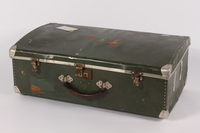
Green painted aluminum trunk used by a German Jewish girl on a Kindertransport
Object
Green aluminum trunk used by 14 year old Gisela Marx on a Kindertransport from Dulken, Germany, to Great Britain in August 1939. Gisela’s parents, Erna and Leopold, purchased the trunk for her trip, hoping it would be more waterproof. The Nazi regime, in power in Germany since 1933, persecuted the Jewish population. Leopold, a former diplomat and WWI veteran, and Erna, a member of a wealthy, landowning family, thought their status would protect them, but in 1939, they decided to send Gisela to safety. The friend paid to care for her never showed up, and she was sent to live with an Orthodox rabbi, and then to boarding school. In 1941, Gisela had to perform military service and she chose to become nurse. She worked in a children’s hospital in London. When it was bombed during the Blitz, she was transferred to an American military hospital in Surrey. The war ended when Germany surrendered on May 7, 1945. Gisela’s parents were deported and killed in the Riga Ghetto in December 1941.
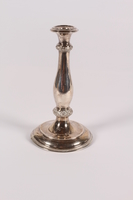
Silver floral embossed candlestick acquired by a former Kindertransport refugee
Object
Silver embossed candlestick, one of a pair, with 2013.476.4, owned by John Peter Eden (formerly Hans Eibuschitz), who escaped Czechoslovakia on a Kindertransport in 1939. The candlesticks were possibly brought to the United States before the war by John’s grandmother. After Germany invaded and annexed Czechoslovakia in March 1939, 12 year old Hans, and 9 year old brother Steven were sent to Great Britain on a Kindertransport. Hans was placed in private boarding schools. After graduation, he attended the London School of Economics to study actuarial science. In 1944 or 1945, he began training with the Royal Air Force. The war ended when Germany surrendered on May 7, 1945, before Hans entered active service.
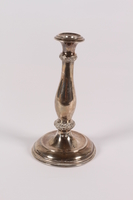
Silver floral embossed candlestick acquired by a former Kindertransport refugee
Object
Silver embossed candlestick, one of a pair, with 2013.476.3, owned by John Peter Eden (formerly Hans Eibuschitz), who escaped Czechoslovakia on a Kindertransport in 1939. The candlesticks were possibly brought to the United States before the war by John’s grandmother and given to him later. After Germany invaded and annexed Czechoslovakia in March 1939, 12 year old Hans, and 9 year old brother Steven were sent to Great Britain on a Kindertransport. Hans was placed in private boarding schools. After graduation, he attended the London School of Economics to study actuarial science. In 1944 or 1945, he began training with the Royal Air Force. The war ended when Germany surrendered on May 7, 1945, before Hans entered active service.
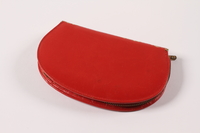
Set of four manicure tools in a red case brought by a German Jewish girl on a Kindertransport
Object
Cuticle cutters and pusher, a nail file, and manicure scissors in a fitted red leather case brought by 14 year old Gisela Marx on a Kindertransport from Dulken, Germany, to Great Britain in August 1939. Her parents Erna and Leopold purchased the manicure set for her to take on her journey. The Nazi regime, in power since 1933, persecuted the Jewish population. Leopold, a former diplomat and WWI veteran, and Erna, a member of a wealthy, landowning family, thought their status would protect them, but in 1939, they decided to send Gisela to safety. The friend paid to care for her never showed up, and she was sent to live with an Orthodox rabbi, and then to boarding school. In 1941, Gisela had to perform military service and became a nurse. She worked in a children’s hospital in London. When it was bombed during the Blitz, she was transferred to an American military hospital in Surrey. The war ended when Germany surrendered on May 7, 1945. Gisela’s parents were deported and killed in the Riga Ghetto in December 1941.
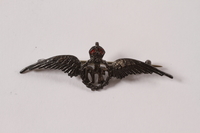
Royal Air Force sweetheart's wings pin acquired by a Czech Jewish Kindertransport refugee
Object
Sterling silver Royal Air Force sweetheart's wings pin acquired by 17 year old Hans Eibuschitz, a Jewish Czech refugee, while he was in training with the British Royal Air Force from about 1944 to 1945. A sweetheart pin was given to loved ones by soldiers, and were not issued by the RAF. After Germany invaded and annexed Czechoslovakia in March 1939, 12 year old Hans, and his 9 year old brother Steven were sent to Great Britain on a Kindertransport. Hans was placed in private boarding schools. After graduation, he attended the London School of Economics to study actuarial science. In 1944 or 1945, he began training with the Royal Air Force. The war ended when Germany surrendered on May 7, 1945, before Hans entered active service.
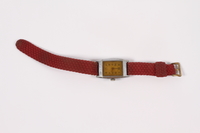
Wristwatch with red band and a red pouch taken by a German Jewish girl on a Kindertransport
Object
Wristwatch with a red band and a red cloth case brought by 14 year old Gisela Marx on a Kindertransport from Dulken, Germany, to Great Britain in August 1939. Gisela’s parents, Erna and Leopold, purchased the watch for Gisela’s journey. The Nazi regime, in power since 1933, persecuted the Jewish population. Leopold, a former diplomat and WWI veteran, and Erna, a member of a wealthy, landowning family, thought their status would protect them, but in 1939, they decided to send Gisela to safety. The friend paid to care for her never showed up, and she was sent to live with an Orthodox rabbi, and then to boarding school. In 1941, Gisela had to perform military service and she became a nurse. She worked in a children’s hospital in London. When it was bombed during the Blitz, she was transferred to an American military hospital in Surrey. The war ended when Germany surrendered on May 7, 1945. Gisela’s parents were deported and killed in the Riga Ghetto in December 1941.
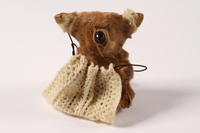
Bear, a stuffed koala bear, with modern covering, carried by a German Jewish girl on a Kindertransport
Object
Stuffed koala bear named Bear, with cover knitted by Gisela in 2001, carried by Gisela Marx, 14, on a Kindertransport from Dulken, Germany, to Great Britain in August 1939. The Nazi regime, in power since 1933, persecuted the Jewish population. Leopold, a former diplomat and WWI veteran, and Erna, a member of a wealthy, landowning family, thought their status would protect them, but in 1939, they decided to send Gisela to safety. The friend paid to care for her never showed up, and she was sent to live with an Orthodox rabbi, and then to boarding school. In 1941, Gisela had to perform military service and she became a nurse. She worked in a children’s hospital in London. When it was bombed during the Blitz, she was transferred to an American military hospital in Surrey. The war ended when Germany surrendered on May 7, 1945. Gisela’s parents were deported and killed in the Riga Ghetto in December 1941.
Gisela Eden papers
Document
The Gisela Eden papers consists of correspondence, restitution paperwork, a poesie book, a diary, and family photographs relating to the experiences of Gisela Eden (née Marx) who traveled to England from Germany on a Kindertransport. The correspondence includes letters and postcards written by family and friends in Germany to Gisela Marx while she was living in England, 1939-1957. The letters, largely written by her parents, Leopold and Erna Marx, and relatives are written in German. The restitution paperwork is directed to Gisela Eden and relates to the Marx family. The paperwork includes correspondence, financial materials, notes, and a photocopy of Gisella Amalie Marx’s birth certificate, 1925. The photographs include photographs of the Eden family in Germany include Leopold and Erna Marx and their daughter, Gisela Marx, circa 1930s-1940s. The diary of Gisela Marx was written from March 29, 1939 to August 1941 in German and consists of 91 written pages. Gisela begins her diary while still living in Dülken, Germany and records her travels on the Kindertransport to England and her experiences while in England. Some of the entries include a newspaper clippings in English and small sketches. Gisela Marx’s poesie book, 1935-1942, includes autographs, notes, and drawings by her family and friends.
Prayer book
Object
Commercially published miniature version of a Megillat, or Book of Esther, scroll with illustrations returned to Gisela Marx when she went back to Dülken, Germany, after the war. Gisela was sent to safety by her parents Edna and Leopold who placed her on a Kindertransport to England in August 1939. Erna and Leopold gave some of their religious items, including this scroll and a scroll of daily prayers (2013.476.10), and other valuables, such as jewelry, to a pastor in Dülken, to preserve them. He buried the materials in his cellar. The paster was later arrested and sent to a concentration camp for preaching anti-Nazi sermons. With the help of the Red Cross, the pastor located and wrote to Gisela in 1950. When she came to visit, he returned the items to Gisela, fulfilling her parents' request. He told Gisela that her parents had believed they were being deported to Theresienstadt. Gisela later discovered that they had been sent from Dusseldorf on December 11, 1941, to the Riga ghetto where they perished.



